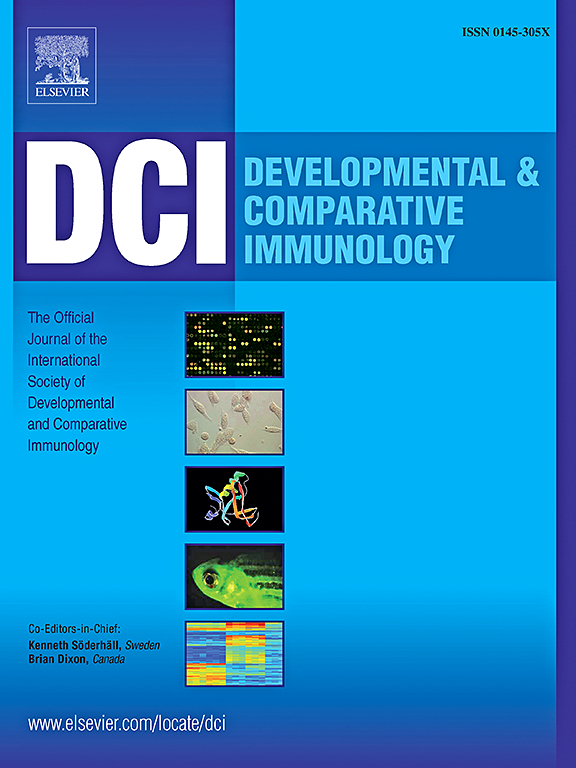猪IFI44L通过激活IFN-Ⅰ信号通路抑制传染性胃肠炎病毒(TGEV)复制。
IF 2.4
3区 农林科学
Q1 FISHERIES
引用次数: 0
摘要
干扰素诱导蛋白44-Like (IFI44L)是干扰素刺激基因(ISGs)家族的一员,在多种生物过程中发挥关键作用,特别是在抗病毒防御和免疫调节中。然而,人类IFI44L在病毒复制中的作用仍然存在争议。为了进一步鉴定猪IFI44L (poIFI44L),我们首次克隆了猪IFI44L,并研究了其在猪传染性胃肠炎病毒(TGEV)复制中的作用。全长poIFI44L cDNA编码一个439个氨基酸的蛋白,包含一个n端TLDc结构域和一个c端ras样GTPase结构域。小鼠、仓鼠、大鼠、雪貂、狗、兔、猫、马、人、猴、牛、骆驼的同源物序列相似度为48.6% ~ 70.2%。在poly (I:C)和干扰素- α (IFNα-2a)处理下,pifi44l在PK-15细胞中的表达呈剂量依赖性上调。此外,TGEV感染在mRNA和蛋白水平上显著诱导了pofi44l的表达。体外过表达poIFI44L导致TGEV N基因mRNA水平、N蛋白表达和病毒滴度呈剂量依赖性显著降低,而sirna介导的敲低poIFI44L可增强病毒复制。从机制上讲,pofi44l上调IFN-β和ISRE启动子活性,上调IFN-β和下游isg (ISG56和ISG60)的产生。总的来说,我们的数据表明,pofi44l作为一种先天免疫效应物,通过激活IFN-β/ISGs信号通路来抑制TGEV。本文章由计算机程序翻译,如有差异,请以英文原文为准。
Porcine IFI44L inhibits transmissible gastroenteritis virus (TGEV) replication by activating IFN-Ⅰ signaling pathway
Interferon-Induced protein 44-Like (IFI44L), a member of the interferon-stimulated genes (ISGs) family, plays a critical role in a variety of biological processes, particularly in antiviral defense and immune regulation. However, the role of human IFI44L in viral replication remains controversial. To further characterize porcine IFI44L (poIFI44L), we cloned poIFI44L for the first time and investigated its role in porcine transmissible gastroenteritis virus (TGEV) replication. The full-length poIFI44L cDNA encodes a 439-amino acid protein, containing an N-terminal TLDc domain and a C-terminal Ras-like GTPase domain. Sequence similarity to orthologs from mouse, hamster, rat, ferret, dog, rabbit, cat, horse, human, monkey, cattle and camel ranged from 48.6 % to 70.2 %. poIFI44L expression was dose-dependently upregulated in PK-15 cells by both poly (I:C) and interferon-alpha (IFNα-2a) treatments. Furthermore, TGEV infection significantly induced poIFI44L expression at both the mRNA and protein levels. Overexpression of poIFI44L in vitro resulted in significantly reduced TGEV N gene mRNA levels, N protein expression, and viral titers in a dose-dependent manner, whereas siRNA-mediated knockdown of poIFI44L enhanced viral replication. Mechanistically, poIFI44L upregulated IFN-β and ISRE promoter activities and upregulated the production of IFN-β and downstream ISGs (ISG56 and ISG60). Collectively, our data suggest that poIFI44L acts as an innate immune effector that suppresses TGEV by activating the IFN-β/ISGs signaling pathway.
求助全文
通过发布文献求助,成功后即可免费获取论文全文。
去求助
来源期刊
CiteScore
6.20
自引率
6.90%
发文量
206
审稿时长
49 days
期刊介绍:
Developmental and Comparative Immunology (DCI) is an international journal that publishes articles describing original research in all areas of immunology, including comparative aspects of immunity and the evolution and development of the immune system. Manuscripts describing studies of immune systems in both vertebrates and invertebrates are welcome. All levels of immunological investigations are appropriate: organismal, cellular, biochemical and molecular genetics, extending to such fields as aging of the immune system, interaction between the immune and neuroendocrine system and intestinal immunity.

 求助内容:
求助内容: 应助结果提醒方式:
应助结果提醒方式:


